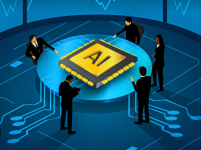In the past, getting a job in an IT company was considered one of the safest and most stable career paths. With attractive salaries, job security, and chances to work on global projects, thousands of students from engineering and computer science backgrounds aimed to land a spot in companies like TCS, Infosys, Wipro, or Capgemini.
However, in recent years, there's been a shift. The rise of Artificial Intelligence, machine learning, automation, and no-code/low-code platforms is slowly changing how these companies operate. A natural question arises among young professionals and fresh graduates: Are IT companies still a reliable career choice, or is automation replacing entry-level tech jobs?
Let’s be clear—IT companies are evolving, not disappearing.
Automation tools like Robotic Process Automation (RPA), code generation platforms, and AI-based testing tools are handling tasks that once required manual effort. For instance:
While this may sound concerning, what’s really happening is a shift in job profiles, not the end of them.
Earlier, many freshers joined IT companies as testers, support engineers, or junior developers with simple responsibilities. But now, companies expect more specialized skills:
Students who upgrade their skills and stay relevant are still landing jobs. But those who rely only on outdated languages or basic skills are facing competition—from both AI and better-prepared peers.
Even the smartest AI can’t replace the full value of a human being. IT companies still need:
These roles require judgment, adaptability, and communication—traits that AI still lacks.
So, is it safe to join an IT company? Yes—but with a condition: you must be willing to learn continuously.
Many companies are offering internal certifications, online training portals, and mentorship programs. You don’t need to become an AI expert—but you should be aware of how AI is affecting your industry.
If you’re a student planning to work in IT:
The IT sector is not shrinking—it’s shifting.
India is still a global leader in IT exports, and companies are hiring in areas like blockchain, cloud engineering, ethical hacking, IoT, and AI development. These are not jobs of the future—they’re already here.
If you adapt your skills and stay curious, IT companies are still one of the best launchpads for a tech career.
Do you still see IT companies as a strong career option for freshers?
Are students prepared for the changes that automation is bringing into the industry?
What new skills do you believe every IT job-seeker should master in 2025?
Let us know your thoughts in the comments!
However, in recent years, there's been a shift. The rise of Artificial Intelligence, machine learning, automation, and no-code/low-code platforms is slowly changing how these companies operate. A natural question arises among young professionals and fresh graduates: Are IT companies still a reliable career choice, or is automation replacing entry-level tech jobs?
What’s Actually Changing Inside IT Companies?
Let’s be clear—IT companies are evolving, not disappearing.
Automation tools like Robotic Process Automation (RPA), code generation platforms, and AI-based testing tools are handling tasks that once required manual effort. For instance:
- Basic testing is now managed by automated testing frameworks.
- Documentation is often generated using AI assistants.
- Customer support roles are being supported or replaced by chatbots.
While this may sound concerning, what’s really happening is a shift in job profiles, not the end of them.
Entry-Level Jobs Are Evolving, Not Vanishing
Earlier, many freshers joined IT companies as testers, support engineers, or junior developers with simple responsibilities. But now, companies expect more specialized skills:
- Python, DevOps, and cloud computing knowledge
- Familiarity with tools like Git, Docker, and Jenkins
- Understanding of AI/ML basics, even for non-AI roles
Students who upgrade their skills and stay relevant are still landing jobs. But those who rely only on outdated languages or basic skills are facing competition—from both AI and better-prepared peers.
The New Roles AI Can’t Replace
Even the smartest AI can’t replace the full value of a human being. IT companies still need:
- Project managers to handle communication and timelines
- Developers who can understand client needs and design scalable systems
- Engineers who can solve bugs creatively and adjust systems in real-time
- Cybersecurity professionals who can think like attackers
These roles require judgment, adaptability, and communication—traits that AI still lacks.
Students Must Prepare Differently
So, is it safe to join an IT company? Yes—but with a condition: you must be willing to learn continuously.
Many companies are offering internal certifications, online training portals, and mentorship programs. You don’t need to become an AI expert—but you should be aware of how AI is affecting your industry.
If you’re a student planning to work in IT:
- Learn at least one strong programming language like Python or Java.
- Get familiar with cloud platforms like AWS or Azure.
- Take free or paid courses in AI, data analytics, or cybersecurity.
- Practice communication and problem-solving—interviews are about more than just code.
A Future-Proof Career Still Exists in IT
The IT sector is not shrinking—it’s shifting.
India is still a global leader in IT exports, and companies are hiring in areas like blockchain, cloud engineering, ethical hacking, IoT, and AI development. These are not jobs of the future—they’re already here.
If you adapt your skills and stay curious, IT companies are still one of the best launchpads for a tech career.
Join the Conversation
Do you still see IT companies as a strong career option for freshers?
Are students prepared for the changes that automation is bringing into the industry?
What new skills do you believe every IT job-seeker should master in 2025?
Let us know your thoughts in the comments!

